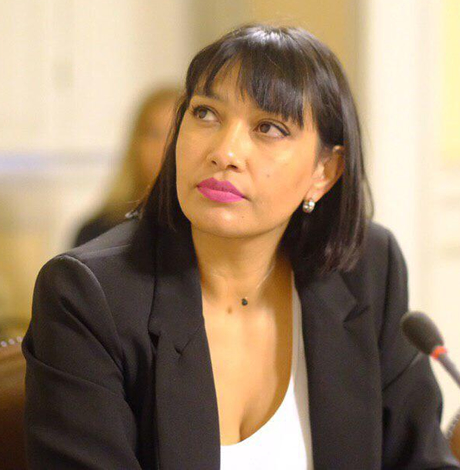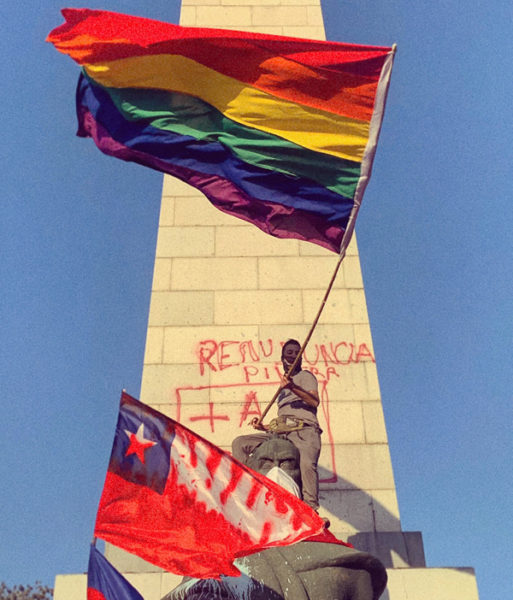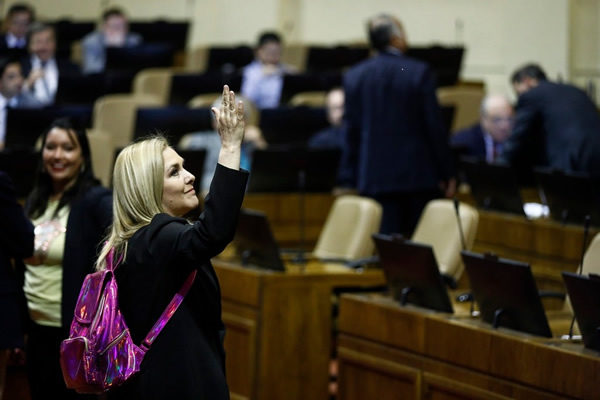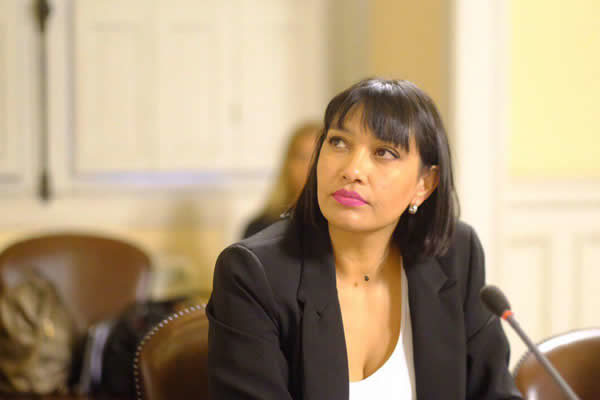News
La reivindicación de derechos y violencia contra LGBTQ marcan la crisis política en Chile
Activistas han participado en manifestaciones contra el gobierno de Piñera


CONCEPCIÓN, Chile — En menos de tres días una manifestación convocada por estudiantes contra el aumento en las tarifas del metro se convirtió en una imponente e inesperada protesta nacional por años de desigualdades en Chile, paralizando al país por completo y poniendo en jaque a toda la clase política chilena. Millones de personas han salido a las calles en los últimos días para manifestar su descontento.
Sin embargo, algunas de las masivas marchas han terminado con manifestantes atacando negocios, incendiando y saqueando supermercados en la peor revuelta que se ha visto en el país en décadas. En respuesta, el presidente de Chile, Sebastián Piñera, decretó Estado de Emergencia sacando a los militares a las calles y sumó un toque de queda que profundizó el conflicto desencadenando en los peores episodios de violación de Derechos Humanos en los últimos 30 años en país latinoamericano. Un grupo de congresistas anunció el domingo una acusación constitucional contra Piñera.
“Estás semanas han sido una bomba de tiempo que todos sabíamos que iba explotar, pero no sabíamos que explotaría ahora y con esta intensidad”, dice Alessia Injoque, presidenta ejecutiva de Fundación Iguales, una organización LGBTQ chilena. Similar opinión tiene Franco Fuica, coordinador de legislación y políticas públicas de Organizando Trans Diversidades (OTD), “estamos viviendo una revolución social”, afirma.
La crisis en Chile, se arrastra hace mucho tiempo. En 1973 el dictador Augusto Pinochet realizó un golpe de Estado para derrocar a Salvador Allende, el primer presidente socialista electo democráticamente en América Latina. Pinochet dio marcha atrás al modelo de Allende y comenzó a implementar una fórmula económica diametralmente opuesta, el país se convirtió en una especie de laboratorio del neoliberalismo e inició una cruel dictadura que persiguió, torturó y mató a sus opositores.
Los cambios económicos de Pinochet fueron liderados por un grupo de economistas liberales educados en la Universidad de Chicago, donde aprendieron de las ideas de los estadounidenses Milton Friedman y Arnold Harberger, los “Chicago boys” implementaron reformas económicas y sociales que todo lo privatizó, las cuales fueron selladas en la Constitución Política de la República de Chile de 1980, que permanece vigente.
Chile es el único país en el mundo en que el agua es privada, las pensiones de jubilación son bajas, hay mala salud y la mayoría de los hogares tienen dificultades para llegar a fin de mes. Un informe publicado en enero de este año por la Comisión Económica de América Latina y el Caribe (Cepal), que analizó la evolución de la pobreza, el gasto y la inclusión social, reveló que Chile sigue manteniendo sus altos índices de desigualdad. “El 1 por ciento de la población concentra el 26,5 por ciento de la riqueza”, concluyó la investigación.
“Llevamos años en un sistema injusto, donde todo está hecho para que siempre ganen los mismos. Más allá de esa injusticia hubo impunidad, donde no pasó nada con personas que hicieron mucho daño, paso del dolor a la frustración, el gobierno fue indolente y todo reventó”, aclara Injoque. La activista trans sinceró haber sentir miedo “me dio escalofríos cuando supe que los militares saldrían a las calles” recuerda.
“Piñera le declaró la guerra a mis nietos por cadena nacional, mandó al Ejército a dispararles a matar por manifestar pacíficamente su enorme sufrimiento y al pueblo le está pareciendo que hay complicidad ahí y yo escuchó otra voz generalizada: ‘renuncia Piñera'”, dijo al Washington Blade, Pamela Jiles (Frente Amplio, una nueva fuerza política en el Congreso de Chile), quién ha liderado el impeachment.
“Mi deber como parlamentaria es acusar constitucionalmente a Piñera, como lo habría hecho la diputada humanista Laura Rodríguez, utilizando una atribución parlamentaria y un instrumento constitucional, de espaldas a la élite y de cara al pueblo”, explicó Jiles. “No puede ser de otro modo ya que ha puesto en grave peligro la seguridad de la nación, ha sumido el país en el desgobierno y es el principal -aunque no único- responsable de las muertes de quienes debía proteger”.
Desde el estallido de esta revolución social se han reportado brutales casos de violación a Derechos Humanos por las Fuerzas Armadas y de Orden chilenas. Represión, abuso de poder, violencia desmedida, detenciones ilegales y muertes alertaron a Michelle Bachelet, Alta Comisionada de Derechos Humanos en la Organización de Naciones Unidas (ONU) y expresidenta de Chile, por lo que decidió enviar un equipo de observadores a verificar los casos, entre ellos el de un joven homosexual detenido ilegalmente, torturado y abusado sexualmente por la policía.
Josué Maureira, estudiante de Medicina de la Pontificia Universidad Católica de Chile (PUC), fue detenido mientras entregaba primeros auxilios a manifestantes heridos, denunció que fue apaleado hasta quedar inconsciente, vejado por su orientación sexual y expresión de género, nuevamente golpeado hasta romperle el tabique nasal, violado con una porra, amenazado de muerte y encarcelado por supuestas agresiones a los carabineros. El Instituto Nacional de Derechos Humanos (INDH) presentó una querella por tortura sexual.
“Los Estados de Emergencia autorizan a restringir la libre circulación, pero no a atentar contra la vida de las personas. La ‘salida de la crisis’, como le gusta decir a la élite, será únicamente la salida de Piñera. Es nuestra obligación detener la matanza de inocentes”, subrayó Jiles.
Shane Cienfuegos, activiste y coordinadore del área de investigaciones de Colectiva Neutres, que en las últimas semanas ha logrado unificar a la mayoría de los grupos LGBTQ mencionó que “yo estoy en las calles desde la evasión del metro, activando los territorios.Convocamos a todas las organizaciones y llegaron más de 50, hicimos un diagnóstico y descubrimos que estábamos siendo vulnerades”.

El pasado viernes 25 octubre se convocó a una masiva manifestación en todo el país, #LaMarchaMásGrandeDeChile fue trending topic mundial en Twitter y los canales de televisión cubrían la histórica protesta en cadena nacional, la cual que congregó a más de un millón y medio de personas. “Lo otro que iba a decir, que también hemos olvidado mencionar, aparte de los equipos -de fútbol- y las banderas chilenas, es muy importante, hay muchas banderas del movimiento LGBTQ, mucha gente también de la disidencia sexual que también están presentes y son movimientos que están manifestándose hoy día y sus banderas están ahí presentes en las calles”, interrumpió en vivo Mónica Rincón, periodista de CNN y aliada LGBTQ.
A través de sus redes sociales la mayoría de las instituciones LGBTQ chilenas llamaron a manifestarse. Mientras que las disidencias sexuales se desplegaron en grupo a participar. “Salimos con mucha pasión y creatividad para levantar con fuerza y al mismo tiempo reivindicar nuestros derechos que por siglos han sido vulnerados por el Estado de Chile y contra un sistema neoliberal que nos oprime”, añadió Cienfuegos.
En 1999 Chile despenalizó la sodomía, en 2012 sumó una ley antidiscriminación -la que los activistas apuntan como deficiente- y desde 2015 las personas del mismo sexo pueden acceder a una Unión Civil. En diciembre de este año entrará en vigencia la Ley de Identidad de Género que reconocerá el derecho a la identidad de las personas trans. A lo anterior, se suman políticas públicas que benefician a la diversidad sexual y de género, sin embargo, aún falta mucho para lograr la plena igualdad en el país.
“Conformamos una mesa con 19 organizaciones de la sociedad civil con presencia a lo largo de todo Chile, para poder trabajar en aquellas materias de ley que sean necesarias modificar para poder asegurar el reconocimiento, los derechos y las garantías de la población LGBTQ+”, mencionó Natalia Castillo (Frente Amplio), una joven congresista de la Cámara de Diputados que ha impulsado una bancada transversal por los derechos de lesbianas, gais, bisexuales, trans y queer, denominada “la bancada por la diversidad”.

Hace más de un año el proyecto de ley de matrimonio igualitario duerme en la Comisión de Constitución del Senado. Por otro lado, la “bancada por la diversidad” levantada por Castillo trabaja en la elaboración de otras iniciativas legislativas a favor de la diversidad sexual y de género que serán presentadas en las próximas semanas.
“Yo creo que es una gran oportunidad de perfeccionar la ley antidiscriminación, promover una ley que penalice la incitación al odio, y quizás, este es el momento para que las personas LGBTQ+ sean reparadas por el Estado de Chile por la histórica vulneración”, concluyó Fuica.
Kansas
ACLU sues Kansas over law invalidating trans residents’ IDs
A new Kansas bill requires transgender residents to have their driver’s licenses reflect their sex assigned at birth, invalidating current licenses.

Transgender people across Kansas received letters in the mail on Wednesday demanding the immediate surrender of their driver’s licenses following passage of one of the harshest transgender bathroom bans in the nation. Now the American Civil Liberties Union is filing a lawsuit to block the ban and protect transgender residents from what advocates describe as “sweeping” and “punitive” consequences.
Independent journalist Erin Reed broke the story Wednesday after lawmakers approved House Substitute for Senate Bill 244. In her reporting, Reed included a photo of the letter sent to transgender Kansans, requiring them to obtain a driver’s license that reflects their sex assigned at birth rather than the gender with which they identify.
According to the reporting, transgender Kansans must surrender their driver’s licenses and that their current credentials — regardless of expiration date — will be considered invalid upon the law’s publication. The move effectively nullifies previously issued identification documents, creating immediate uncertainty for those impacted.
House Substitute for Senate Bill 244 also stipulates that any transgender person caught driving without a valid license could face a class B misdemeanor, punishable by up to six months in jail and a $1,000 fine. That potential penalty adds a criminal dimension to what began as an administrative action. It also compounds the legal risks for transgender Kansans, as the state already requires county jails to house inmates according to sex assigned at birth — a policy that advocates say can place transgender detainees at heightened risk.
Beyond identification issues, SB 244 not only bans transgender people from using restrooms that match their gender identity in government buildings — including libraries, courthouses, state parks, hospitals, and interstate rest stops — with the possibility for criminal penalties, but also allows for what critics have described as a “bathroom bounty hunter” provision. The measure permits anyone who encounters a transgender person in a restroom — including potentially in private businesses — to sue them for large sums of money, dramatically expanding the scope of enforcement beyond government authorities.
The lawsuit challenging SB 244 was filed today in the District Court of Douglas County on behalf of anonymous plaintiffs Daniel Doe and Matthew Moe by the American Civil Liberties Union, the ACLU of Kansas, and Ballard Spahr LLP. The complaint argues that SB 244 violates the Kansas Constitution’s protections for personal autonomy, privacy, equality under the law, due process, and freedom of speech.
Additionally, the American Civil Liberties Union filed a temporary restraining order on behalf of the anonymous plaintiffs, arguing that the order — followed by a temporary injunction — is necessary to prevent the “irreparable harm” that would result from SB 244.
State Rep. Abi Boatman, a Wichita Democrat and the only transgender member of the Kansas Legislature, told the Kansas City Star on Wednesday that “persecution is the point.”
“This legislation is a direct attack on the dignity and humanity of transgender Kansans,” said Monica Bennett, legal director of the ACLU of Kansas. “It undermines our state’s strong constitutional protections against government overreach and persecution.”
“SB 244 is a cruel and craven threat to public safety all in the name of fostering fear, division, and paranoia,” said Harper Seldin, senior staff attorney for the ACLU’s LGBTQ & HIV Rights Project. “The invalidation of state-issued IDs threatens to out transgender people against their will every time they apply for a job, rent an apartment, or interact with police. Taken as a whole, SB 244 is a transparent attempt to deny transgender people autonomy over their own identities and push them out of public life altogether.”
“SB 244 presents a state-sanctioned attack on transgender people aimed at silencing, dehumanizing, and alienating Kansans whose gender identity does not conform to the state legislature’s preferences,” said Heather St. Clair, a Ballard Spahr litigator working on the case. “Ballard Spahr is committed to standing with the ACLU and the plaintiffs in fighting on behalf of transgender Kansans for a remedy against the injustices presented by SB 244, and is dedicated to protecting the constitutional rights jeopardized by this new law.”
National
After layoffs at Advocate, parent company acquires ‘Them’ from Conde Nast
Top editorial staff let go last week

Former staff members at the Advocate and Out magazines revealed that parent company Equalpride laid off a number of employees late last week.
Those let go included Advocate editor-in-chief Alex Cooper, Pride.com editor-in-chief Rachel Shatto, brand partnerships manager Erin Manley, community editor Marie-Adélina de la Ferriére, and Out magazine staff writers Moises Mendez and Bernardo Sim, according to a report in Hollywood Reporter.
Cooper, who joined the company in 2021, posted to social media that, “Few people have had the privilege of leading this legendary LGBTQ+ news outlet, and I’m deeply honored to have been one of them. To my team: thank you for the last four years. You’ve been the best. For those also affected today, please let me know how I can support you.”
The Advocate’s PR firm when reached by the Blade said it no longer represents the company. Emails to the Advocate went unanswered.
Equalpride on Friday announced it acquired “Them,” a digital LGBTQ outlet founded in 2017 by Conde Nast.
“Equalpride exists to elevate, celebrate and protect LGBTQ+ storytelling at scale,” Equalpride CEO Mark Berryhill said according to Hollywood Reporter. “By combining the strengths of our brands with this respected digital platform, we’re creating a unified ecosystem that delivers even more impact for our audiences, advertisers, and community partners.”
It’s not clear if “Them” staff would take over editorial responsibilities for the Advocate and Out.

In an official statement released at the reveal event Capital Pride Alliance described its just announced 2026 Pride theme of “Exist, Resist, Have the Audacity” as a “bold declaration affirming the presence, resilience, and courage of LGBTQ+ people around the world.”
The statement adds, “Grounded in the undeniable truth that our existence is not up for debate, this year’s theme calls on the community to live loudly and proudly, stand firm against injustice and erasure, and embody the collective strength that has always defined the LGBTQ+ community.”
In a reference to the impact of the hostile political climate, the statement says, “In a time when LGBTQ+ rights and history continue to face challenges, especially in our Nation’s Capital, where policy and public discourse shape the future of our country, together, we must ensure that our voices are visible, heard, and unapologetically centered.”
The statement also quotes Capital Pride Alliance CEO and President Ryan Bos’s message at the Reveal event: “This year’s theme is both a declaration and a demand,” Bos said. “Exist, Resist, Have Audacity! reflects the resilience of our community and our responsibility to protect the progress we’ve made. As we look toward our nation’s 250th anniversary, we affirm that LGBTQ+ people have always been and always will be part of the United States’s history, and we will continue shaping its future with strength and resolve,” he concluded.
-

 Mexico5 days ago
Mexico5 days agoUS Embassy in Mexico issues shelter in place order for Puerto Vallarta
-

 Netherlands4 days ago
Netherlands4 days agoRob Jetten becomes first gay Dutch prime minister
-

 Sports4 days ago
Sports4 days agoMore than a dozen LGBTQ athletes medal at Olympics
-

 Books3 days ago
Books3 days agoNew book profiles LGBTQ Ukrainians, documents war experiences



















